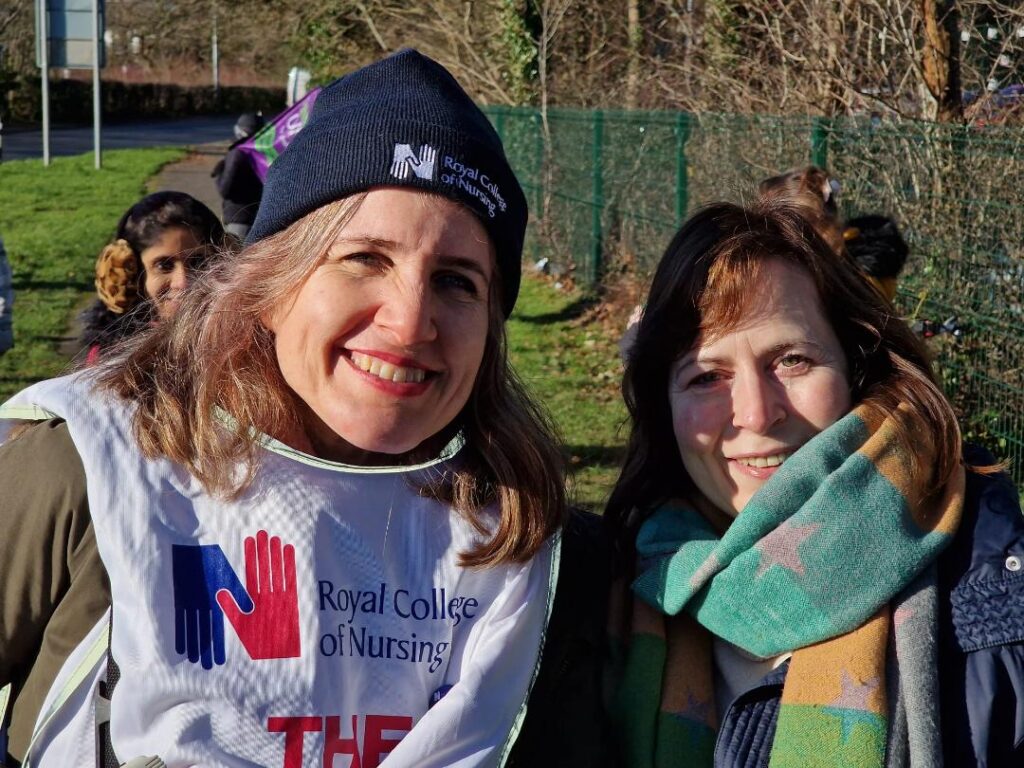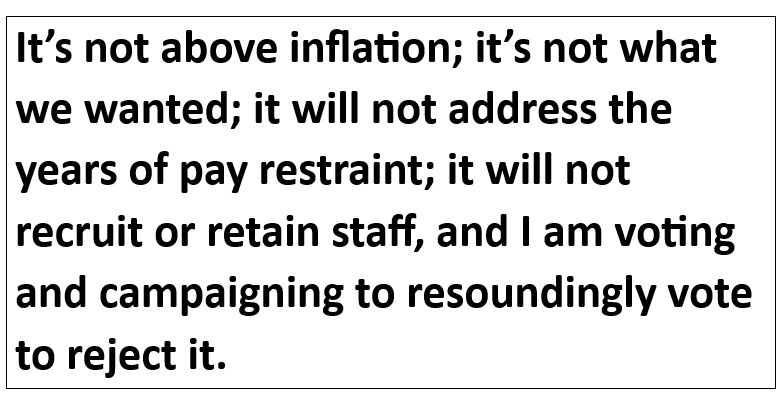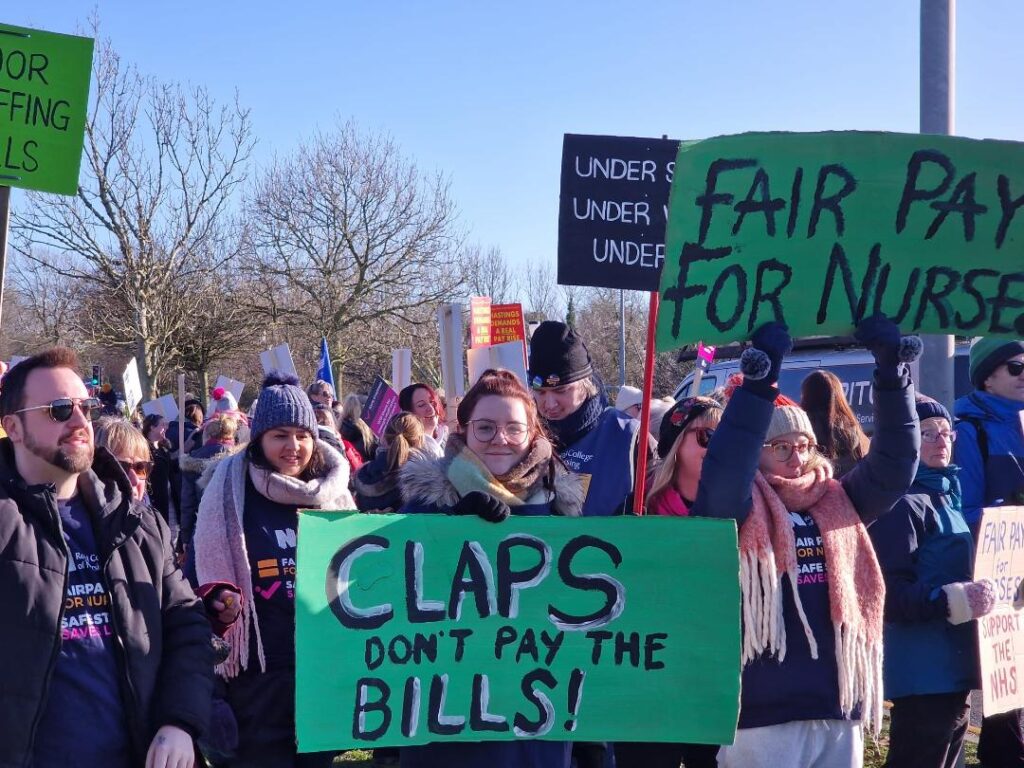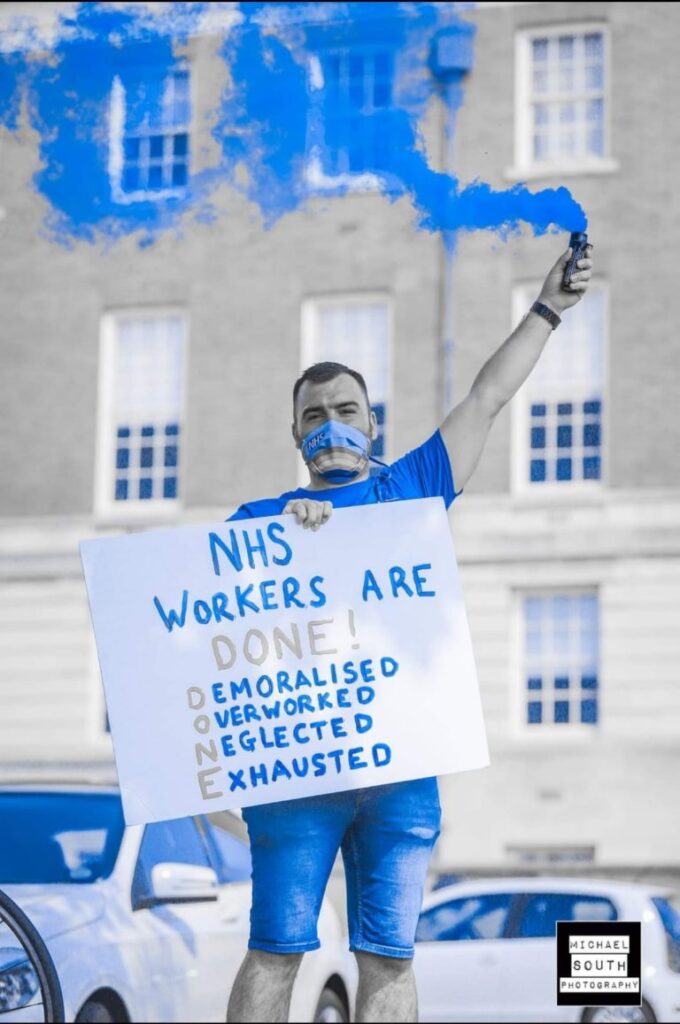Ray Goodspeed spoke to Antonia Berelson, a Specialist Nurse in East Sussex and branch committee member in the Royal College of Nursing (RCN) about the issues in the strike and what she thinks about the recent pay offer.
RG – Hi Antonia. Can you summarise the main reasons why you thought it was necessary to go on strike?
Well I’ve been a nurse for well over 16 years now and I’ve seen my colleagues struggling. We’re haemorrhaging experienced staff, were not recruiting nurses – we’re over 47,000 nurses short.
As a workforce, we’re recovering from the collective trauma of Covid. Going on strike – no one ever makes that decision lightly – but yes, it’s about maintaining the respect for the profession but also being rewarded appropriately with a fair pay rise. It’s not really acceptable that in the sixth largest economy we have nurses going to foodbanks – and they are! It’s seeing my colleagues struggling to make ends meet– especially those on the lower bands, the HCAs (Health Care Assistants), for example.
It’s a hard decision with lots of different factors to consider. Nobody can question our integrity. When Covid happened, we risked our lives and many a time I sat in a room with inadequate PPE, holding the hand of the dying, and every single health care professional can name someone, a colleague, that they have lost during the Covid time.

RG – Of course, you’ve had no increase in real terms in a while, have you?
Exactly – well over twelve years of pay restraint! This was part of our campaign as well – to talk about pay restoration for the job we do because we have essentially lost a third of our wages over the years – our wages aren’t increasing. Even now they say that inflation is going to be high and we’re just not keeping up. So we are having people choosing not to go into nursing, or they are nursing but choosing to go off to New Zealand or Australia rather than stay in this country. Don’t forget that the NHS has run on goodwill for so long but unfortunately the well of goodwill has run dry. There are those potentially coming up for retirement and many of those who would otherwise have seen out a few more years before retirement are retiring early (if they are lucky enough) or potentially leaving the NHS and getting something that is a bit easier for them. It’s really, really sad to see what’s happening.
RG – When the strike was on, how was it for you? Was it well-supported?
Absolutely. I was a picket supervisor for the days we were on strike and the mood was…you know… nurses got very emotional on the picket line. Some of them became a little bit tearful but when they saw the public support it was amazing. We were right on the roundabout so we constantly had people beeping their horns. We had members of the public coming and dropping off coffees and you know…a woman came up and she was like “What can I do?” She was so appreciative. She said, “I have just gone over the road to have a hospital appointment and I’m just so grateful”. We had a grandmother drop off a pizza for us because we had looked after her grand-daughter in the special care baby unit. It was really rewarding for us, as nurses, being so supported by the general public – overwhelming support. It was with a heavy heart that we decided to picket but the mood was determined and I think we found our voice on the picket line. And it was so lively – with singing and chanting and even dancing!

RG – Between strikes, was morale high? Were people optimistic about the dispute?
Again, I think the mood was determined. I think that the RCN has not always had the best, well-attended branch meetings but, all of a sudden, we saw so many nurses altogether. Colleagues were seeing people they’d trained with and it was a sense of real determination. For so many years we have been gaslighted by the government – successive governments. We’ve been told “Oh it’s a vocation!” (With a predominantly female workforce, may I add). We just thought this was our lot. Very often we would miss our lunch break, work overtime (quite often unpaid), finish late, but we could see, as has been repeated numerous times, that patients weren’t dying because nurses were striking – nurses were striking because patients were dying. We became production-line nurses. We couldn’t do the job we wanted to do; we felt so frustrated, and more than anything it was the hypocrisy of the government who were happy to stand on their doorsteps and applaud us and yet when we wanted to ask for a decent rise, just to be able to make ends meet, the government were determined not to listen to us.
RG – What do you think of the way the RCN and other unions negotiated during the dispute?
I think we had to stand united as health care workers. We were all working under “Agenda for Change”, for the NHS, and this fight is not just for safe staffing, or pay, it’s all about the continuation of the NHS. We can see the disintegration of it in real time. I feel, in a personal capacity, that as health care unions we should be acting together and I feel that with the negotiations…I look in admiration at the BMA and how they have stood their ground.
There is a debate in the RCN about whether Pat Cullen [RCN General Secretary – Ed] should have called the strikes off. I feel that if we could have worked with other unions, together, we would have been more successful. I don’t believe that we should have been negotiating separately and I am disappointed that we were not able to have more joint unions working. There were attempts to ban other unions placards from RCN picket lines. They even discouraged singing, but they were mostly ignored!

RG – What is you view of the recent pay offer? What do you think the mood is at work?
The mood at work is disappointment and anger, disillusionment. We were on the picket line, calling for “pay restoration”, an above-inflation pay rise. This offer is poor but it’s also part of the old “divide and conquer”. That one-off payment is quite seductive – they know that nurses are struggling. But some of the lower bands are on universal credit, so they will lose part of their universal credit payments – and it will be taxed too. It’s not good enough. It’s a real kick in the teeth to get a supposed Covid bonus that is too little – too late.
And as for the “jam tomorrow” – it’s not above inflation; it’s not what we wanted; it will not address the years of pay restraint; it will not recruit or retain staff, and I am voting and campaigning to resoundingly vote to reject it. The nurses have finally found their voices after many years. In the RCN we have all these WhatsApp groups across the country and we are angry but we’re also finding an allegiance with ALL of the unions and across the board through “NHS Workers Say No” and “Nurses United” – we are building our strength and we are seeing how the RCN was acting like a union. Let’s get it acting even more like one – listening to its members voices. I feel that people are determined to speak up – regardless of what happens – to say that this is not what we were promised and it does not go any way to solving the nursing crisis.
RG – Do you think most members will reject it?
I think a lot of members are incensed by it. Also – there is a lot of debate about this but in a personal capacity, I do not agree with the idea of a separate nurse pay grade spine. 1) It plays into the “divide and conquer” tactic, because the allied health professionals have openly said that they are not happy with it. 2) It was not necessarily part of our negotiations and has been brought in all of a sudden, and 3) nurses are the largest workforce in the NHS. You should never believe what a Tory says and anyway, there is no guarantee that if we have a separate nursing spine, we will be paid more – they could use it against us!

All of these are nebulous promises. One thing is certain in life – You can’t trust the Tories! We need an actual solid pay rise. And other nurses that I have been speaking to – they quote the bin men and they quote the fire fighters. None of them begrudge them their pay rise, of course, but they are saying “How come we aren’t worth that? Why aren’t we worth as much as they are?”
RG – So do you think it is possible to win a better deal from the govt by continuing the action?
I would like to think so, because don’t forget, if we accept this pay deal, it will go against the doctors who are still actively campaigning and then the govt will say, “Oh look the nurses have accepted” So I think we need to hold out, hold our nerve and say “No!”. The government thought that the public would be against us but the public still support us. We could go forward in trying to get joint action with the junior doctors, re-ballot the people that didn’t get over the line before and seize on this and remember we are a trade union. We should rely on our members who are not going to be silenced.
We know we are on borrowed time here with the NHS, if we don’t sort out this crisis. If we don’t continue to speak up for it, then we are in very sorry times. We need to build on the power of the trade unions because I don’t see that we have any support that we need within the Labour Party.



